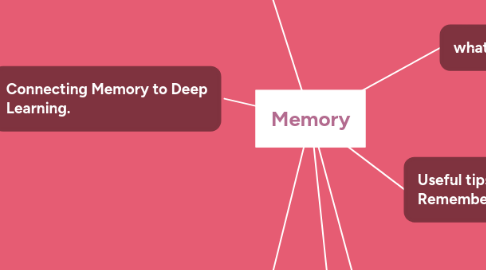Memory
作者:Fahdah wadi

1. Types of Memory Processes
1.1. short-term memory.
1.1.1. Items in the short-term memory are forgotten less than 30 seconds
1.1.2. Although limited, it has its own uses; e.g. remembering topics of conversation to keep track with the speaker
1.2. long term memory
1.2.1. Although limited, it has its own uses; e.g. remembering topics of conversation to keep track with the speaker
1.2.1.1. 1- procedural memory
1.2.1.2. 2-semantic memory
1.2.1.3. 3-episodic memory
2. Connecting Memory to Deep Learning.
2.1. Memorizing isolated items and words is important. However, in college learning, it is not enoug.
2.1.1. You need to connect your memorizing with DEEP LEARNING. (learn and understand why’s and how’s behind what you are memorizing)
2.1.2. You need to learn and understand ideas and concepts.
2.1.3. You need to learn and understand ideas and concepts
3. IMPROVING YOUR MEMORY
3.1. Although knowing specific words is helpful, remembering concepts and ideas is more important.
4. MAKING SUMMARIES .
4.1. Condensing the main ideas into a concise written summary, which helps in storing them in the long-term memory.
4.2. Helpful for preparing for essay and short-answer exams.
4.3. Helpful for preparing for essay and short-answer exams.
5. what is memory?
5.1. Memory refers to the processes that are used to acquire, store, retain, and later retrieve information. There are three major processes involved in memory: encoding, storage, and retrieval.
6. Useful tips for Studying to Remember
6.1. Overlearn the material
6.2. Be sure you have the big picture
6.3. Look for connections between courses and life.
6.4. Pay attention to what you are hearing or reading
6.5. Check the internet.
7. STRATEGIES FOR IMPROVING YOUR MEMORIES.
7.1. USING REVIEW SHEETS, MIND MAPS, AND OTHER TOOLS
7.2. MNEMONICS
7.3. USING SUMMARIES


